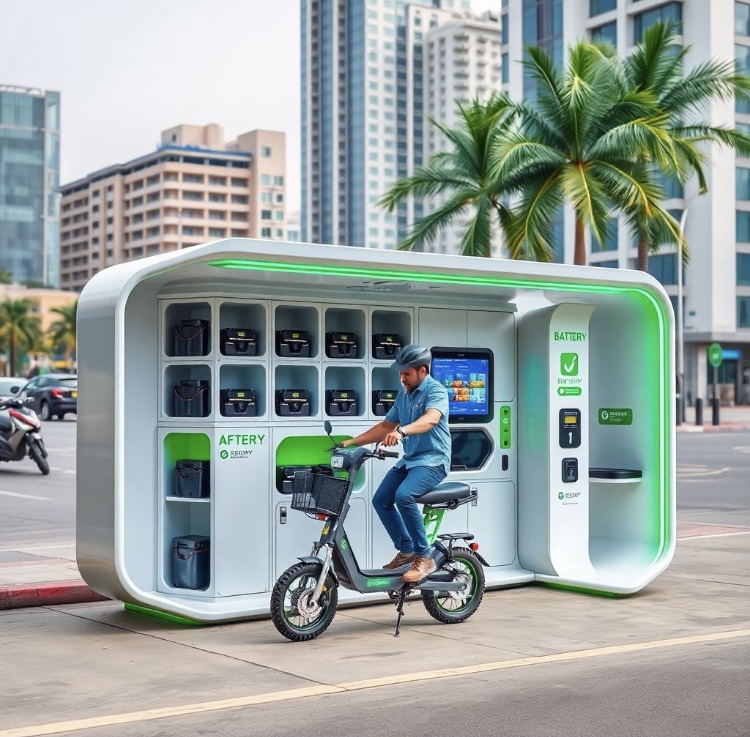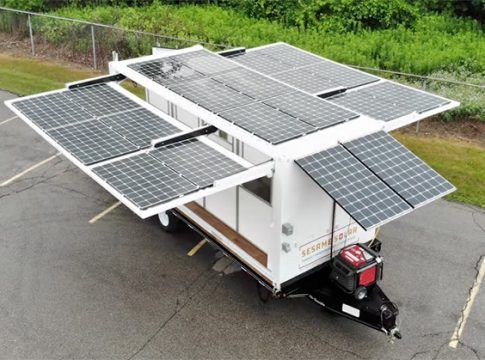5 Best Battery Swapping Stations in Lagos
As you may already know, Lagos is gradually becoming a hotspot for electric mobility innovations. One solution aiding this transition is battery swapping stations because they enable electric vehicle (EV) drivers to swap dead or low batteries for fully charged ones, instead of waiting hours to charge them.
In this article, we will explore the five best battery swapping stations in Lagos. However, before that, let’s briefly discuss what battery swapping stations are, why they are being used, and how they compare to charging stations.
What are battery swapping stations?
Battery swapping stations are facilities that store fully charged batteries so as to allow owners of electric vehicles, especially electric motorbikes, to replace their depleted batteries with already charged ones.
They are usually modular and can easily and quickly be installed anywhere as kiosks or fixed structures. Most times, they are built with solar panels to make charging the batteries more affordable and sustainable. Moreover, they are very beneficial since they support rapid turnaround and help reduce range anxiety, especially for commercial or delivery fleets.
Why Use Them?
Speed & convenience: Unlike charging, swapping takes just minutes instead of hours to carry out.
Reduced downtime: With battery swapping, users, especially commercial riders, need not experience periods where the vehicle becomes inactive since they can easily swap dead batteries for fully charged ones.
Reliability in regions with irregular power supply: This is because some swap stations incorporate solar or hybrid power to ensure supply.
Environmental benefits: They ensure fewer greenhouse gas emissions, especially if powered by clean energy. Moreover, most, if not all, of these stations are less reliant on petrol or diesel.
The Best Battery Swapping Stations in Lagos
Below are some of the best battery swapping stations, or planned systems, in and around Lagos.
1. AaraGO Battery Swap Station:
Located in Victoria Island, AaraGO is a green‑technology startup that launched a solar‑powered battery swapping station for electric motorbikes in Lagos. This swapping station, situated in Ikoyi, supports solar power, making the station more resilient to grid instability.
2. Swap Station Mobility (SSM) Swap Stations:
Based in Ikoyi, SSM is another clean-energy company providing swap station points along major demand routes and logistics bases in Lagos. They have a partnership with Glovo & Siltech to equip Glovo couriers with e‑motorbikes and provide battery swapping and charging facilities. They also recently partnered with redcity to install swapping stations and kiosks in various areas around the state.
3. MAX’s Solar‑Powered Battery Swap Station:
MAX is a Lekki-based company reported to have launched West Africa’s first fully solar‑powered swap station. According to sources, the station, positioned in Lekki, uses a 20 kWp solar photovoltaic array, a 24 kW inverter, and a 30 kWh battery bank. It also stores excess energy for use after sundown or during low sunlight, making it very sustainable. In addition to this, the company plans, in the coming years, to position many more stations along major routes in the state, including Ikeja, Yaba, and so on, to make them more accessible to drivers.
4. Spiro Swap Stations:
Spiro, an electric mobility company in Nigeria, is said to have a network of 100 active battery swap stations across Nigeria, 64 of which exist in Lagos. They can be found in areas such as Oshodi, Ebute Metta, Ikorodu, and more. The company is currently making plans to scale up to 1,000 stations by the end of 2025, and 2,000 nationwide by 2026.
5. Siltech Swap Station:
Another Victoria Island-based company, Siltech focuses on developing an electric mobility ecosystem. They’ve achieved this by not only manufacturing electric vehicles but also battery swapping stations for said vehicles. The company remains a pioneer in electric mobility in Africa and their products are known to be reliable and efficient.
Conclusion
Battery swapping stations are rapidly emerging as a practical, efficient, and cleaner alternative to traditional charging, especially in a traffic‑dense, grid‑unstable city like Lagos. With players like Swap Station Mobility, AaraGO, MAX, Spiro, and Siltech, the momentum is building. For residents, riders, and fleet operators, staying informed about the locations, costs, and services of these stations helps in making smarter choices and contributing to a greener, more efficient transport future for Lagos.
Here at RedCity, we design and build the skeletal frameworks for the battery charging ports. Whether it’s a solar kiosk or a fixed structure, you can trust us to get it done. Get a glimpse into some of our past jobs here and request a quote here to get started. While you’re at it, check out our other products and services here and discover more of our exciting content here.
What do you think of these 5 best battery swapping stations in Lagos? Would you be trying out any? Comment below.


